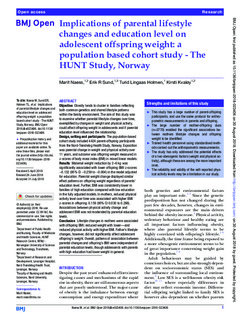| dc.contributor.author | Næss, Marit | |
| dc.contributor.author | Sund, Erik Reidar | |
| dc.contributor.author | Holmen, Turid Lingaas | |
| dc.contributor.author | Kvaløy, Kirsti | |
| dc.date.accessioned | 2018-09-05T07:09:36Z | |
| dc.date.available | 2018-09-05T07:09:36Z | |
| dc.date.created | 2018-09-04T13:05:12Z | |
| dc.date.issued | 2018 | |
| dc.identifier.issn | 2044-6055 | |
| dc.identifier.uri | http://hdl.handle.net/11250/2560812 | |
| dc.description.abstract | Objective Obesity tends to cluster in families reflecting both common genetics and shared lifestyle patterns within the family environment. The aim of this study was to examine whether parental lifestyle changes over time, exemplified by changes in weight and physical activity, could affect offspring weight in adolescents and if parental education level influenced the relationship.
Design, setting and participants The population-based cohort study included 4424 parent-offspring participants from the Nord-Trøndelag Health Study, Norway. Exposition was parental change in weight and physical activity over 11 years, and outcome was offspring weight measured in z-scores of body mass index (BMI) in mixed linear models.
Results Maternal weight reduction by 2–6 kg was significantly associated with lower offspring BMI z-scores: −0.132 (95% CI −0.259 to −0.004) in the model adjusted for education. Parental weight change displayed similar effect patterns on offspring weight regardless of parents’ education level. Further, BMI was consistently lower in families of high education compared with low education in the fully adjusted models. In mothers, reduced physical activity level over time was associated with higher BMI z-scores in offspring: 0.159 (95% CI 0.030 to 0.288). Associations between physical activity change and adolescent BMI was not moderated by parental education levels.
Conclusion Lifestyle changes in mothers were associated with offspring BMI; reduced weight with lower—and reduced physical activity with higher BMI. Father’s lifestyle changes, however, did not significantly affect adolescent offspring’s weight. Overall, patterns of association between parental changes and offspring’s BMI were independent of parental education levels, though adolescents with parents with high education had lower weight in general. | nb_NO |
| dc.language.iso | eng | nb_NO |
| dc.publisher | BMJ Publishing Group | nb_NO |
| dc.rights | Navngivelse-Ikkekommersiell 4.0 Internasjonal | * |
| dc.rights.uri | http://creativecommons.org/licenses/by-nc/4.0/deed.no | * |
| dc.title | Implications of parental lifestyle changes and education level on adolescent offspring weight: a population based cohort study - The HUNT Study, Norway | nb_NO |
| dc.type | Journal article | nb_NO |
| dc.type | Peer reviewed | nb_NO |
| dc.description.version | publishedVersion | nb_NO |
| dc.source.journal | BMJ Open | nb_NO |
| dc.identifier.doi | 10.1136/bmjopen-2018-023406 | |
| dc.identifier.cristin | 1606591 | |
| dc.description.localcode | © Author(s) (or their employer(s)) 2018. Re-use permitted under CC BY-NC. No commercial re-use. See rights and permissions. Published by BMJ. | nb_NO |
| cristin.unitcode | 194,65,20,15 | |
| cristin.unitname | Helseundersøkelsen i Nord-Trøndelag | |
| cristin.ispublished | true | |
| cristin.fulltext | original | |
| cristin.qualitycode | 1 | |

